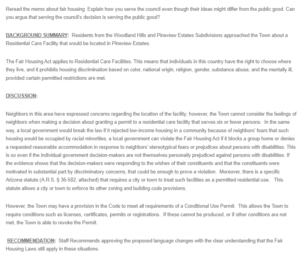Fair Housing and Conflict of Interest
In most situations, the public good and the council’s decision may not align. The lack of alignment can be attributed to a conflict of interest. Conflict of interest poses a significant threat to the integrity of various agencies, officials, governments, and their decisions. Eliminating conflict of interest is a complicated process due to its complexity in the real-time application. It is difficult to draw a line where conflict of interest begins. Public office is created to serve the needs of all citizens in accordance with the law. Thus, to maintain integrity, the public office must ensure inclusion by eliminating any possibility of discrimination against specific minority groups (OECD, 2005). Any decisions that the public office makes must consider the welfare and rights of all stakeholders.
In the case study, allowing the changes is essential to ensure that violations do not occur. The public good, in this case, should not only consider the current residents. Instead, the expected members of the facility should be considered. This decision is ideal because it accommodates the law, which provides all citizens with the right to choose their residence. Accordingly, this eliminates the potential for a violation based on the feelings of the current community members. In this case, the council’s decision demonstrates public good.
Suppose the council took the alternative decision, it would signal a significant violation and lack of consideration for the rights of citizens. The feelings of the community members are most likely based on past experiences and stereotypes. However, minority groups still have rights that seek to eliminate discriminative tendencies. Therefore, the public office is responsible for ensuring the public good regardless of the opinions of various groups in the community. Subsequently, this ensures conflict of interest and violation of regulations (Kettl, 2018).
References
Kettl, D. F. (2018). Politics of the Administrative Process. Sage.
OECD. (2005). Managing Conflict of Interest in the Public Sector.
ORDER A PLAGIARISM-FREE PAPER HERE
We’ll write everything from scratch
Question
Reread the memo about fair housing. Explain how you serve the council even though their ideas might differ from the public good. Can you argue that serving the council’s decision is serving the public good?

Fair Housing and Conflict of Interest
BACKGROUND SUMMARY: Residents from the Woodland Hills and Pineview Estates Subdivisions approached the Town about a Residential Care Facility that would be located in Pineview Estates.
The Fair Housing Act applies to Residential Care Facilities. This means that individuals in this country have the right to choose where they live, and it prohibits housing discrimination based on color, national origin, religion, gender, substance abuse, and the mentally ill, provided certain permitted restrictions are met.
DISCUSSION:
Neighbors in this area have expressed concerns regarding the location of the facility; however, the Town cannot consider the feelings of neighbors when making a decision about granting a permit to a residential care facility that serves six or fewer persons. In the same way, a local government would break the law if it rejected low-income housing in a community because of neighbors’ fears that such housing would be occupied by racial minorities, a local government can violate the Fair Housing Act if it blocks a group home or denies a requested reasonable accommodation in response to neighbors’ stereotypical fears or prejudices about persons with disabilities. This is so even if the individual government decision-makers are not themselves personally prejudiced against persons with disabilities. If the evidence shows that the decision-makers were responding to the wishes of their constituents and that the constituents were motivated in substantial part by discriminatory concerns, that could be enough to prove a violation. Moreover, there is a specific Arizona statute (A.R.S. § 36-582, attached) that requires a city or town to treat such facilities as a permitted residential use. This statute allows a city or town to enforce its other zoning and building code provisions.
However, the Town may have a provision in the Code to meet all requirements of a Conditional Use Permit. This allows the Town to require conditions such as licenses, certificates, permits or registrations. If these cannot be produced, or if other conditions are not met, the Town is able to revoke the Permit.
RECOMMENDATION: Staff Recommends approving the proposed language changes with the clear understanding that the Fair Housing Laws still apply in these situations.

